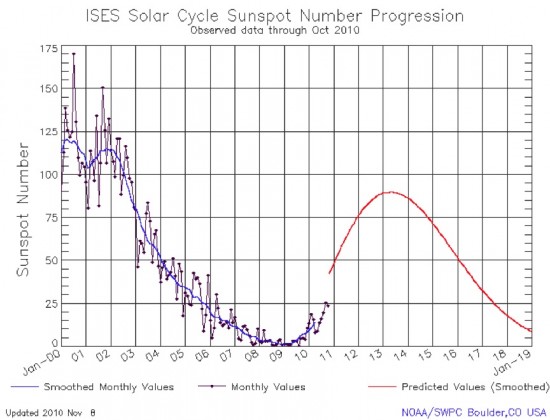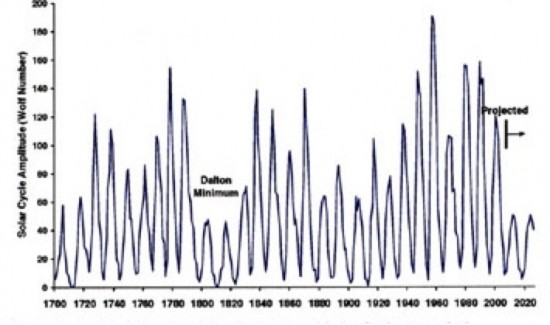No policy on climate is better than bad policy
To bet on the climate wager it is much more logical to prepare for cooling. If they prepare for cooling and it warms the adaptation is relatively easy. If they prepare for warming and it cools we are all in trouble.
By Dr. Tim Ball
Pascal’s Wager was an idea proposed by French Philosopher Blaise Pascal (1623-1662) that people should bet that God existed because it was more logical than betting he didn’t. If you believe in God and there isn’t one you haven’t lost anything, but if you don’t believe and there is a God then you are in a lot of trouble.
No policy on climate is better than bad policy. However, if governments feel they must take action on climate change a similar type of Climate wager is required.
Figure 1 is a plot of the changing pattern of the Solar Cycle 24 in the solar cycle.
You can see that the recovery in to Solar Cycle 24 continues and though brief it suggests a track toward a lower sunspot number. Compare the expected number with past numbers shown in Figure 2. Even if the number reaches 75 it is comparable in paucity to those during the Dalton Minimum. Many scientists think 50 a more reasonable maximum. Regardless, we know when numbers are low the temperature is lower. In other words the evidence for cooling continues.
Figure 2: Sunspot cycles 1700 to 2020. Cycles 24 and 25 on right.
Source: Badalyan, Obridko and Sykora.
Currently all governments are preparing for warming, Even token statements by the Chinese, who are clearly going to do nothing that will slow economic growth, are about warming. In all cases it is a policy based on the position taken by the national weather office. When Maurice Strong arranged the Intergovernmental Panel on Climate Change (IPCC) he did it through the World Meteorological Organization (WMO), which meant the national offices became part of the deception about the causes of global warming and then climate change. It also means all other government departments must plan from their “official” position. Politicians don’t or won’t challenge the weather departments on the issue because they lose in the eyes of the public if they claim to know more than the experts; even if the experts are scientifically wrong.
The IPCC Science Report ‘proved’ the false science that human CO2 was the only cause of global warming. Then they produced speculative research in the Report of Working Group II titled “Impacts, Adaptation, and Vulnerability” about the negative impacts of warming. In reality, for most parts of the world warming has many benefits. Lower fuel requirements for heating and transport; extended growing seasons, less loss of life due to exposure, greater diversity of crops at middle and high latitudes are just a few examples. As a result of their work and the scare stories exploited by the media the public believe warming is totally disastrous. What they need to know is that cooling is a much greater threat with increased energy requirements, decreased food production and many more deaths.
To bet on the climate wager it is much more logical to prepare for cooling. If they prepare for cooling and it warms the adaptation is relatively easy. If they prepare for warming and it cools we are all in trouble. Consider the impact on many parts of the Northern Hemisphere including Canada, Europe, Russia, and northern China. Nobody is farming north of these regions and the crops they grow are already adapted from northern climate conditions.
Many people, but especially environmentalists oppose genetically modified (GM) crops. What they forget is that plant breeding is genetic modification and has gone on for thousands of years. The difference is that plant breeding is like doing surgery with a chain saw, while genetic modification is like laser surgery. With plant breeding you select for a certain characteristic but do this by moving large blocks of genes and really have no idea of what side effects might occur. In addition it takes at least 10 to 12 years to bring a plant to field readiness. If we delay preparation for cooling much longer there will no time to prepare for much cooler conditions expected by 2020.
Genetic modification can put new crops in the field in two years
Genetic modification can put new crops in the field in two years. They can modify single genes and can also introduce trigger genes to turn a new trait on or off at predetermined stages of growth. Crops are now designed to reduce chemical use or survive reduced water conditions, among many other possibilities. We are on the verge of having many of our pharmaceuticals grown in the field. Increasing yields will increase supply and reduce the need to go back to marginal lands. For example, less land is under cultivation in North America now than in the 1930s as people learned from the effects of the dust bowl conditions. Forest areas have increased as land was taken out of production and reverted to forests. Greater diversity of crops is now possible as GM makes sufficient difference to allow previously marginal crops to work in a new region or larger area.
In his book, Saving the World with Pesticides and Plastic Dennis Avery makes a very sensible argument that if loss of natural ecologies is the concern then increased productivity with such things as GM are the answer. If we produced food only with organic methods we would have to clear every forest, cultivate in grasslands and irrigate deserts to achieve yields comparable to our current production. If we increase the yields on the land currently “compromised” then we could set aside all these other areas as natural reserve.
The concept of science producing monsters began with Mary Shelley’s 1818 work Frankenstein; or the Modern Prometheus. She was 19 when it was published and so it incorporates all the naiveté and fears akin to many young modern environmentalists. They coined the term Frankenfoods after Shelley’s character and many work fanatically to scare the public just as they have attacked the process of irradiation, which would allow us to extend the shelf life of food and thus prevent hunger and starvation.
Is there risk in science and advancement? Of course, it is not a “no risk” world. We must always work to reduce risk as much as possible. The question is how much longer will we allow extremists to exploit fears and limit advances in technology in all fields of endeavor. How much longer before governments confront the irrationalism of their views and claims and accept the rationale of Pascal’s Wager at least with climate policy?
This article originally posted at Canada Free Press
Posted by permission. All copyright remains with the author and/or Canada Free Press
Dr. Tim Ball is a renowned environmental consultant and former climatology professor at the University of Winnipeg. Dr. Ball employs his extensive background in climatology and other fields as an advisor to the International Climate Science Coalition, Friends of Science and the Frontier Centre for Public Policy.
Dr. Ball can be reached at: Letters@canadafreepress.com
Older articles by Dr. Tim Ball
Help Make A Difference By Sharing These Articles On Facebook, Twitter And Elsewhere:


